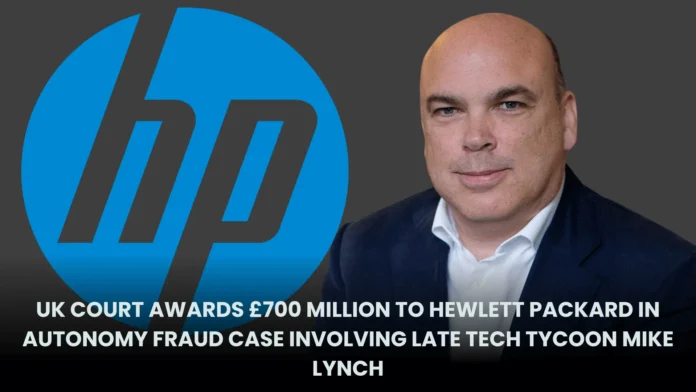£700 Million to Hewlett Packard: Introduction
In a landmark decision, the High Court in London has awarded £700 million ($946 million) in compensation to Hewlett Packard Enterprise (HPE) in a civil fraud case related to the contentious 2011 acquisition of British software firm Autonomy, once led by late tech mogul Mike Lynch.
The verdict marks a major development in a legal saga that has spanned over a decade and raised broader concerns over corporate governance, financial transparency, and due diligence in major international mergers and acquisitions.
Background of the Case: From Billion-Dollar Deal to Billion-Dollar Write-Down
Founded in the 1990s by Mike Lynch, Autonomy quickly rose to prominence as one of the UK’s most innovative software companies, specializing in enterprise search and data analytics. Its success culminated in its high-profile sale to Hewlett Packard (HP) for $11 billion in 2011. At the time, it was one of the largest electronics purchases in UK history.
However, soon after the sale, HP alleged that Autonomy’s leadership had artificially inflated revenues, misrepresented growth figures, and engaged in creative accounting practices to mislead investors and inflate the company’s valuation. In response, HP recorded a $8.8 billion write-down, blaming over $5 billion of that loss on what it described as fraudulent activity by Autonomy’s executives.
Legal Battles Across the Atlantic
The fallout led to complex legal proceedings in both the United Kingdom and the United States. The UK civil procedures went on even though Lynch was cleared of criminal charges in a U.S. federal court in 2024.
The UK High Court initially ruled in favor of HP in 2022, finding that Autonomy executives, including Lynch, had engaged in practices that misrepresented the company’s financial health. This week’s compensation award of £700 million represents a significant legal and symbolic victory for HPE.
“We are pleased that this decision brings us a step closer to the resolution of this dispute,” a Hewlett Packard Enterprise spokesperson said. “We look forward to the further hearing at which the final amount of HPE’s damages will be determined.”
The final hearing is expected in November 2025, and will address several outstanding issues, including the calculation of interest, foreign exchange adjustments, and whether Lynch’s estate may pursue an appeal.
A Tragic Turn: The Death of Mike Lynch
The case took a tragic turn last year when Mike Lynch died unexpectedly in a yacht accident off the coast of Sicily. He was 59. The incident occurred in August 2024, shortly after his U.S. acquittal, while celebrating with family and friends aboard his private vessel, the Bayesian. A violent mini-tornado struck the 56-meter yacht near Porticello, causing it to sink. Among the victims were Lynch’s 18-year-old daughter, Hannah, four close friends, and the yacht’s cook.
Lynch, often dubbed the “British Bill Gates”, had built a reputation for being a visionary in artificial intelligence and data analytics. Prior to his death, he had prepared a written statement in anticipation of the UK court’s decision.
“The ruling exposes HP’s failure and makes clear that the immense damage to Autonomy was down to HP’s own errors and actions,” Lynch wrote in the statement, criticizing HP’s management of the acquisition and the resulting legal consequences. He also indicated that an appeal was under consideration.
Court Recognizes Exaggeration, but Upholds Core Claims
In delivering the ruling, Justice Robert Hildyard acknowledged that while Hewlett Packard’s claims were “substantially exaggerated,” the court found sufficient evidence to support the assertion that Autonomy misrepresented its financial standing prior to the acquisition.
While the legal process edges closer to conclusion, questions remain over how the awarded compensation will be recovered. A spokesperson for Lynch’s estate confirmed to AFP that “any liabilities arising from the case would be addressed through the estate’s legal process.”
As the final hearing approaches, the case stands as a cautionary tale about the risks of large-scale mergers, highlighting the critical importance of due diligence and the long-term ramifications of financial misrepresentation.


